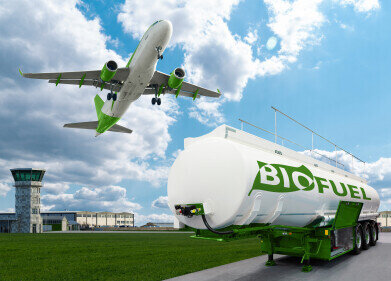Biofuel Industry News
Can Sustainable Fuels Be Used in Existing Aircrafts?
Aug 29 2021
With the potential to reduce total CO2 lifecycle emissions by up to 80% compared to standard jet fuel, Sustainable Aviation Fuel (SAF) has enormous potential. Unlike many alternative fuel types, SAF is compatible with conventional jet engines which means no major changes to infrastructure or engine mechanics are needed to make the switch. In fact, Sustainable Aviation Fuel generally contained less impurities like sulphur, which further reduces emissions and extends the lifespan of engines.
Airbus onboard with Sustainable Aviation Fuel
Sustainable Aviation Fuels are suitable for use with any aircraft powered by standard jet fuel, including iconic models like the Airbus320. While they’re created from renewable sources, SAFs replicate the chemistry of standard petroleum-based fuels and power aircraft engines in the exact same way. Carriers such as Qantas, KLM, Air Canada and British Airways already rely on SAF for many flight routes, with an increasing number of companies making the switch. In 2020, International Airlines Group pledged to power 10% of all flights with SAF by 2030, marking an exciting milestone for the aviation giant that owns brands like Aer Lingus and Iberia.
The advent of SAF blends
As well as being used as a complete replacement, SAF can also be blended with standard jet fuel at ratios as high as 50%. These blends undergo standard quality tests before being reclassed as Jet A or Jet A-1. In the UK, the Department of Transport is advocating for an uptake in Sustainable Aviation Fuel blends and recently proposed a mandate requiring jet fuel suppliers to increase SAF percentages from 2025. The proposal is part of the department’s long-term plan to reduce greenhouse gas emissions within the aviation sector and transition towards a greener and more sustainable future.
“SAF will play a vital role in decarbonising aviation, particularly for long-haul flights, where it is likely to be the most viable option in the coming decades for driving down net emissions from flight,” says Secretary of State for Transport, Rt Hon Grant Shapps MP. “I am determined that the UK should be a world leader in the production and use of SAF, especially as we look towards our hosting of COP26 in November.”
Transitioning to a greener future
Currently, the global aviation sector contributes to around 2.5% of all human-driven greenhouse gas emissions. With air travel set to grow exponentially over the coming decades, this number will continue to increase and has made transitioning to Sustainable Aviation Fuel a top priority. Dr. Raj Shah on behalf of Koehler Instrument Company explores some of the most exciting new developments in ‘Recent Advances in the Sustainable Aviation Industry’.
Digital Edition
PIN 25.3 June/July
June 2024
Analytical Instrumentation - Recent Advances In Various Bench Scale Accelerated Oxidative Testing Methods For Fuels - Petrochemical Industry: Anton Paar Solutions Streamline Processes, Reduce H...
View all digital editions
Events
Jul 30 2024 Jakarta, Indonesia
Jul 30 2024 Jakarta, Indonesia
China Energy Summit & Exhibition
Jul 31 2024 Beijing, China
Jul 31 2024 Chengdu, China
Aug 05 2024 Moon Township, PA, USA


















